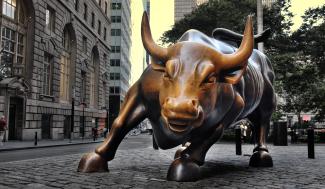Financial analysts are provoking unwarranted volatility in the financial markets with forecasts that are out of line with reality, according to a new study by UBC Sauder School of Business accounting professors Russell Lundholm and Rafael Rogo.

The researchers found that 17% of analyst forecasts are excessively volatile and that this volatility has a negative impact on stock prices. Their study investigated the range of variability between forecasts across the industry for specific companies, as well as the tendency for individual analysts’ forecasts on specific companies to fluctuate throughout a year.
“It’s a case of the tail wagging the dog. Unrealistic forecasts are pervasive, and are having a real impact on the economy,” Lundholm said.
Lundholm and Rogo looked at 856,781 earnings forecasts from 1983 to 2013 using an extensive analysts database and compared them to actual company earnings. The researchers determined how many forecasts exceeded the limits of reasonable variation, based on the criteria that forecasts shouldn’t be more volatile than a company’s actual earnings.
“We drew a line, saying there’s no amount of information that could cause you to change your mind that much about a company,” Lundholm explains.
The researchers found that periods of excessively volatile forecasts were followed by a decline in aggregate stock returns, lining up with Black Monday in 1987, the dot-com bubble and bust, and the global financial crisis.
Given how much volatility they uncovered in the forecasts, Lundholm says the findings show there’s more going on than an honest attempt to assess firm value. He noted that sometimes it’s a case of analysts overreacting to major news events. Other times, volatile forecasting is the consequence of the personal strategic considerations of the analyst.
“Analysts aren’t rewarded for being accurate,” he said. “They’re rewarded for making themselves famous, and making particularly bold predictions often helps them attract attention.”
They found that analysts who make overzealous and often incorrect predictions are largely better known than the average analyst, as many are included in a prominent list of “all-star analysts,” as ranked byInstitutional Investor.
“This isn’t just a few analysts on the margins making wild forecasts – they’re front and centre in the economy, and they’re doing harm,” he says.
The study, “Do Analysts Forecasts Vary Too Much?” is forthcoming in the Journal of Financial Reporting and Accounting.

